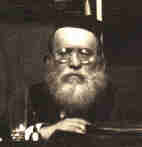 |
Hadrash Ve-Haiyunby the Reisha Rav, HaGoan Rav Aaron LevineElucidated and Adapted by Efraim Levine |
 |
Hadrash Ve-Haiyunby the Reisha Rav, HaGoan Rav Aaron LevineElucidated and Adapted by Efraim Levine |
Vayeishev
Now Yisroel loved Yosef more than all his sons since he was a child of his old age, and he made him a fine woolen tunic. His bothers saw that it was he whom their father loved most of all his brothers so they hated him; and they were not able to speak to him peaceably. (Bereishis 37:3-4)
There are two types of love. The first type is where one loves another because he recognizes the person's true self worth. The second type is where one loves somebody only because by comparison to others that individual stands out as best. The former type is strong and well rooted whereas the latter is weak and shallow; the person is only loved because he represents the lesser of the evils.
We find a similar concept with regard to Noach. The posuk states "Noach was a righteous man, perfect in his generations." (Bereishis 6:9) Rashi there commenting on the words "in his generations" write that some expound this as a praise. Had Noach been in a generation of righteous people he would have been even more righteous. But some expound this as a depreciation. Only in his generations was he considered a righteous individual but had he been in the generation of Avraham he would have been considered as nothing. The dispute can be interpreted as how we view the righteousness of Noach. Do we view it as he was a tzaddik in his own right. Or was he righteous only in comparison to the rest of his generation. The first opinion attributes his righteousness to his own self worth. Therefore, had he lived in a generation of righteous individuals, certainly the caliber of his righteousness would have been concomitantly greater. The second opinion views his righteousness only relative to the rest of his generations. He was just the lesser of the evils. Had he been in the generation of Avraham, he would have been considered as nothing in comparison to Avraham.
Returning to love, let us go a step further. When the love is of the first type, i.e., the self worth, then there is no reason for others to hate the loved individual. After all, he does possess unique qualities that justify his being loved more then they. The second type, i.e., the lesser of the evils, however, can engender hate, for the love only feeds off the deficiencies of the others. The more love showered on one individual, the more the others witness the magnification of their own deficiencies.
With this idea let us take a new look at he posuk. Why did Yaakov show such love to Yosef? Why did he make for Yosef a beautiful tunic? Perhaps Yaakov recognized Yosef's unique qualities. Or maybe Yosef posses no unique qualities but was simply the best of Yaakov children. We need not speculate for the posuk explicitly tells us the reason. "Yaakov loved Yosef more than all his sons since he was a child of his old age." The Targum interprets the words "child of old age old age" as "a wise son." The love stemmed from the unique qualities of Yosef, specifically his wisdom. This being the case, the other brothers had no reason to hate him. Yaakov only loved him because he recognized his unique self worth. The love did not reflect the deficiencies of the other brothers. But why then did the brothers hate Yosef? The posuk goes on to explain that the brothers did not look deeply enough into the real reason for their fathers special love. All they saw was "that it was he (Yosef) whom their father loved most of all his brothers." Here the Posuk does not state the reason as before. Here it just says that he loved him most of all the brothers. Yosef's brothers mistakenly assumed that Yosef related slanderous reports thus degrading their status in their fathers eyes and resulted in Yaakov loving Yosef solely because he was the best of his children, i.e., the lesser of the evils.
The message we can take form this is that when we choose to love something, we must ask ourselves what is the true reason for the love. Does the object of our love really possess true self worth or is it just the lesser of the evils. The difference is significant. Likewise, when we witness love expressed to others, how should we react? If love is attributable to true self worth then we should also rejoice. But if the love is due to being the lesser of the evils, we should take this expression of love as a mussur statement driving us to self-improvement.